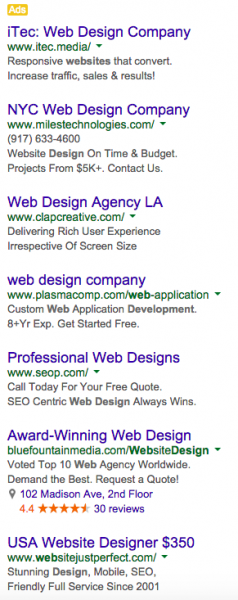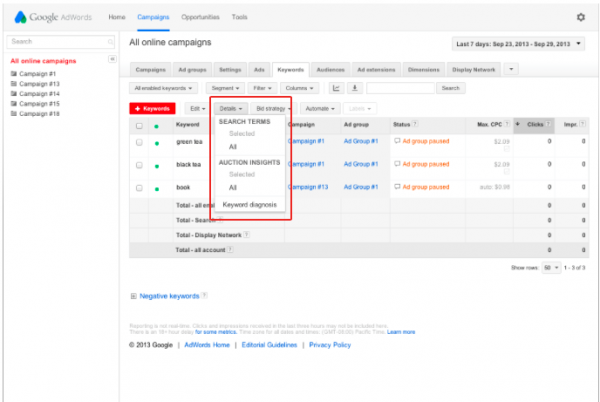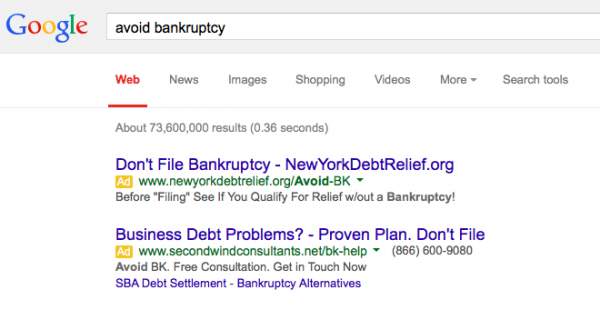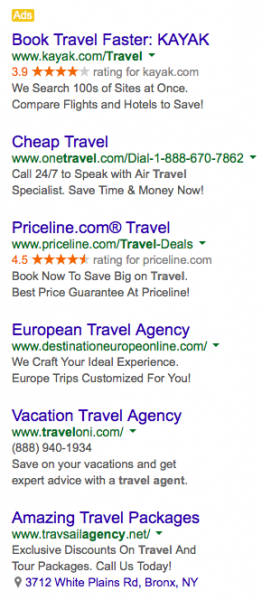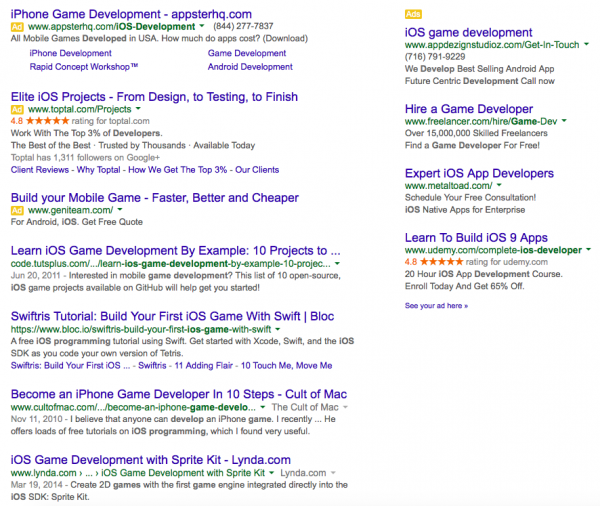In the web marketing world, especially when you’re trying to launch a new business or product page, having too much traffic or too high click through rates on your ads seems like a fantasy problem.
The kind of problem you would die to have.
(Like when you were in middle school, when you hated your best friend for complaining about her boyfriend... because you would have died to have a boyfriend to complain about.)
But, for a business that’s over the awkward middle school phase, it’s a real problem that can cost a lot of money.
Sure, you’re glad you’re getting a lot of traffic, but you’re not glad that it’s the wrong kind of traffic and that you’re paying for something that isn’t converting as well as it should. Even to the point that you’d be willing to take a cut in traffic numbers just to get more milage out of your budget.
For Example…
When I worked for an app development company, we offered game development services, but had a problem with kids following the ads who were just looking for new games to play.
We were wasting our money on twelve year olds who didn’t have $10 to their name, let alone $10,000 they’d need to get a game developed.
And it was a problem.
Fortunately, there’s ways to stop unqualified children, sub-par prospects, and total cheapsters from clicking on the ads you pay good money for.
- 1) You’re Too Welcoming to Cheapsters: Add a ‘Starting From’ Price
- 2)You’re Showing Your Ads to Too Many Irrelevant People: Change Your Match Types
- 3)You’re Paying For Clicks From Unrelated Searches: Weed Through the Red Flags in Your SearchTerms
- 4) You’re Trying to Be Everything to Everyone: Use Words to Highlight Your Speciality & Omit the Wrong People
- 5)Your Searches Don’t Result in Cold, Hard Sales: Use Your CRM to Find the Money-Making Keywords
Get brand new Google ad strategies straight to your inbox every week. 23,739 people already are!
1) You’re Too Welcoming to Cheapsters: Add a ‘Starting From’ Price
Competing on price can be a key way to get business, especially if you’re in a saturated marketplace.
And since words like “cheap” and “free” are and always will be hot, using them in you ad copy to entice clicks can be tempting.
But if you start getting people on your landing pages only to realize they’re falling off when they see your prices, you might need to either scale back the “cheap” language or scale up the price exclusivity.
Some of the best ways to do this are actually the most simple: simply remove the “cheap” or “free” from you ad text and your click through rates will drop.
(Again, not a bad thing. The ones not clicking are the ones you don’t want anyway.)
Another thing to do, if you don’t have any low-price language in your text but are still unintentionally attracting cheapsters is to list a “starting from” price within your ad text.
People who don’t have a problem with that investment amount will still click through, but people who aren’t in a good financial position to invest in you will stay away…. which is exactly what you want.
In this search for ‘web design company’, we see both sides of the coin.
At the bottom, WebsiteJustPerfect is advertising that they only cost $350, but towards the top, Miles Technologies has text claiming that their web design projects cost a minimum of $5,000, weeding out the low-ball customers they don’t want.
2)You’re Showing Your Ads to Too Many Irrelevant People: Change Your Match Types
The gut instinct most people have when they’re trying to advertise for a new product or service is to get their ads in front of the eyes of as many people as possible, boosting their odds of making a sale.
After all, marketing is just a big numbers game, right?
Not exactly.
People take this tendency into AdWords and automatically choose broad match types for the keywords that they’ve chosen to advertise for, thinking it will bring in the traffic they’re missing out on since they’ve probably forgotten a large handful of keywords.
(There’s so many keyword possibilities, getting them all into your ppc management company campaigns would be damn near impossible, right?)
The problem is this tactic rarely ever gets you more quality traffic than your initial set of keywords.
Most of the time, instead, you’ll find it brings in totally unrelated traffic from people searching for things that have nothing in common with what you offer.
To solve it, take your match types up one notch.
If you’re at broad match, move to modified broad match or phrase match.
If you’re in phrase match, move your problem keywords into exact match.
This way you drastically reduce the number of people your ads get shown to, and in turn pull the rug out from under the pile of crappy traffic you’re getting.
In turn making everything about your AdWords campaign (the keywords, the ad copy, the bids, and the budget) more cost effective.
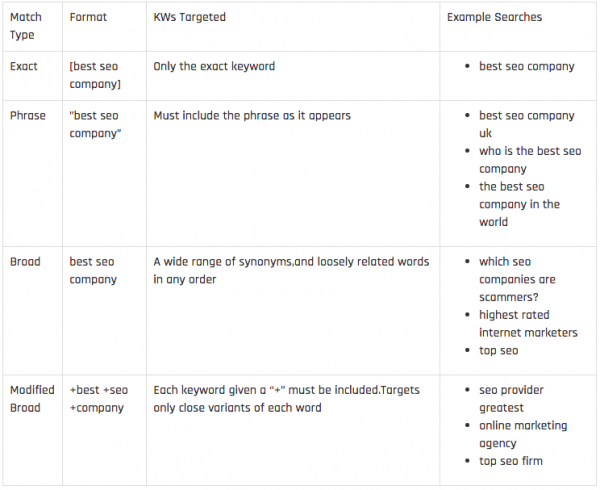
This table explaining AdWords match types from Just SEO Business does a great job of explaining how each match type determines search relevancy.
Hopefully this can give you an idea of whether you need to take things up one notch or jump from broad match to exact match ASAP.
3)You’re Paying For Clicks From Unrelated Searches: Weed Through the Red Flags in Your SearchTerms
Within AdWords, you can see what search phrases people are typing into Google before they click on your ads.
This can give you great insight on what areas to capitalize on in your marketing campaign, but it can also tell you what types of things you need to avoid like the plague.
And what to add to your negative keywords.
Any phrase that doesn’t directly resonate with your product but is still leads people to click on your ads is basically forcing you to pay for higher-than-necessary bounce rates.
Not what you want.
Further, reduce the number of people your ads are shown to by adding the red flags you see to your negative keywords.
The efficiency of your entire marketing and sales funnel will increase.
Google’s AdWords Support shows you exactly where to go to find the search terms people are using before they click on your ads.
(Keywords tab -> Details)
If you’ve never checked this before, or haven't checked it in a while, chances are you’ll find a handful of things to add to your negative keywords list to ward off unwanted traffic.
4) You’re Trying to Be Everything to Everyone: Use Words to Highlight Your Speciality & Omit the Wrong People
Sometimes, just because of the way AdWords and the internet works, you can’t avoid your ad being shown to people it’s not relevant for.
This isn’t necessarily a bad thing, and there are still some very effective ways to keep the wrong people from clicking on your ads and costing you money, even if they do see it in their searches.
Much like the idea of adding a “starting from” price slug in your ad text, you can add a single word in your ad’s headline to immediately show searchers exactly who you are there to help… and who would be wasting their time on your website.
For example, in 5 AdWords Ad Copy Laws You Must Obey, I showed how it could be done with companies helping businesses vs consumers with their bankruptcy problems:
SBA Debt Settlement makes it loud and clear that they work with businesses on the verge of bankruptcy, not consumers.
They don’t waste their money on people with mountains of personal credit card debt, and the people with that kind of debt debt don’t waste their time on a website that can’t help them.
The fourth ad down in this search for ‘travel agency’ makes it very clear who they’re planning trips for.
People who want to go to Europe.
They purposely added this word to filter out those wanting to go to South America, Africa, or Asia.
Want to go to London for high tea and to take a selfie with Big Ben?
They’re ready for you.
Want to go soul-searching and find yourself in India?
Look elsewhere. #sorrynotsorry
5)Your Searches Don’t Result in Cold, Hard Sales: Use Your CRM to Find the Money-Making Keywords
Another way to make sure you’re not attracting the kind of visitors you don’t want is to figure out which keywords or keyword groups you need to delete from your ppc agency campaign altogether.
Some keywords might seem like absolute no-brainers and perfect matches, but once you take a look at their actual long-term performance data, it’s blatantly clear that they’re wolves in sheep’s clothing.
Make sure you’ve got user-tracking software on your site so you know when a person converts from a visitor to a lead to an actual, paying customer.
You might discover that your most expensive clicks are actually your most cost-efficient ones, and that’s totally okay.
The goal of it all—why we’re all here in the first place—is to grow the bottom line via ads.
When you eliminate the keywords that have high traffic-based CTRs but very few sales, and optimize your bidding and budget around those that actually result in paying customers and cash money in the bank, you optimize your entire funnel, not just the part of it that involves lead generation.
For example, a game development company might think “iOS game development” is exactly what their customers are looking for.
After all, they want to make iPhone games, right?
But with a look at the long-term effects of that keyword, it might prove that the people who actually use that keyword are ones who want to learn how to do iOS game development, which is not the ideal customer type that will yield profits in the end.
Better to cut it out.
Keep in mind intent by taking the temperature of your audience...
As you can see from the first four organic (non-ad) results from a search for ‘iOS game development,’ the hints are there that people using this keyword prefer to learn to make their gaming apps for themselves… rather than hiring someone to do it for them.
Start Ditching Irrelevant AdWords Traffic Like that Annoying, Clingy High School Fling You Used to Have
I hope you didn’t ditch her too harshly.
She was probably just really naive at the moment and didn’t know how to handle it all.
Teenage years are tough.
But those AdWords visitors?
You can totally stand them up. Leave them with the bill.
Whatever you want to do.
Because they’re not misunderstood teenagers… they’re leeches sucking the life out of your money.
And the truth of the matter is, if your traffic from AdWords isn’t as stellar as you’d like, there’s usually always one or two tweaks you can make to stop wasting money on the rogue ad clickers who’ll never turn into customers.
Focus more of your time and budget around the ad clickers who represent real money-making potential.
P.S. Learned something new from this post? Then please share it with your friends!

